Small-Town Diploma Holder Builds Rs 200 Crore Turnover Business and Launches Bamboo Fibre Innerwear Brand
26-June-2024
Vol 15 | Issue 26
In 1995, 21-year-old B. Vijayaraghavan, a diploma holder in textile engineering, started a knitting unit in the textile hub of Tiruppur, Tamil Nadu, with an investment of Rs. 5.5 lakh. Starting with one knitting machine and four employees, he embarked on his entrepreneurial journey with big dreams and unwavering confidence.
Nearly three decades later, Vijayaraghavan looks back with pride on his journey. His business has achieved a turnover of Rs 200 crore, producing T-shirts, polos, track pants, and trousers for renowned brands like Van Heusen, Puma, Colorplus, Raymond, Marc O'Polo, Parx, and Boss. He also owns an eco-friendly innerwear brand, Lavos, which contributes Rs 8 crore to the total revenue.
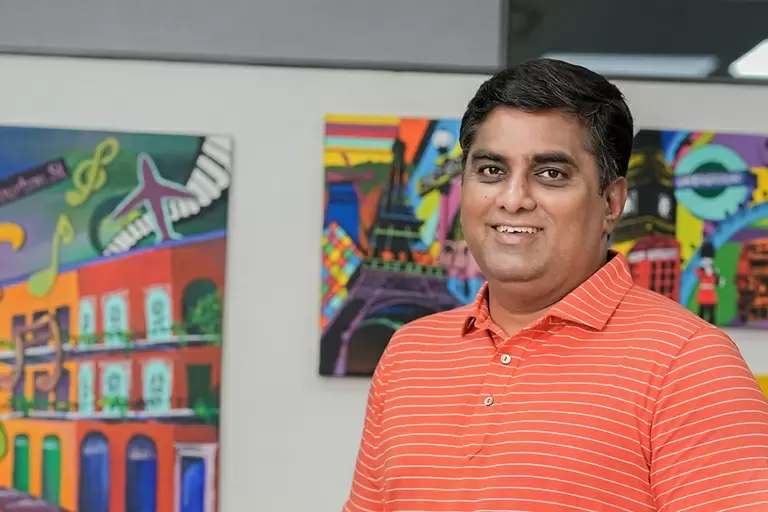
| B Vijayaraghavan, founder of BVK Exports India Pvt Ltd and Brand Lavos, started his business in Tiruppur in 1995 with Rs 5.5 lakh (Photos: Special Arrangement) |
BS Apparel, which began as a proprietorship company, evolved into BVK Exports India Private Limited, commonly known as BVK Apparel. "I named it BS Apparel after my parents, Balakrishnaswamy and Saraswathi," says Vijayaraghavan. Around 1,600 employees work in his business, with 24 dedicated to Lavos.
Although many of his relatives were involved in textile manufacturing and exports, Vijayaraghavan is a first-generation entrepreneur. He was born and raised in the small town of Rajapalayam in southern Tamil Nadu. His father worked as a manager in a cooperative bank, and his mother was a government school teacher.
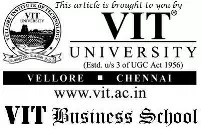
Vijayaraghavan completed his Class 12 from the same Tamil medium school where his mother worked and then pursued a three-year diploma in textile engineering from SSM College of Engineering in Komarapalayam, Namakkal.
In 1994, Vijayaraghavan joined his uncle’s knitting unit in Tiruppur, where he worked for a year to gain experience in all aspects of textile manufacturing.
“It was more like training for me,” says Vijayaraghavan. A year later, in 1995, he purchased a second-hand knitting machine for Rs. 5.5 lakh and set up his own unit, naming it BS Apparels.
Vijayaraghavan began by knitting cotton yarn into fabric and selling it to other manufacturers. As orders increased, he added 20 more knitting machines with the help of bank loans and also purchased sewing machines to start manufacturing polo T-shirts.
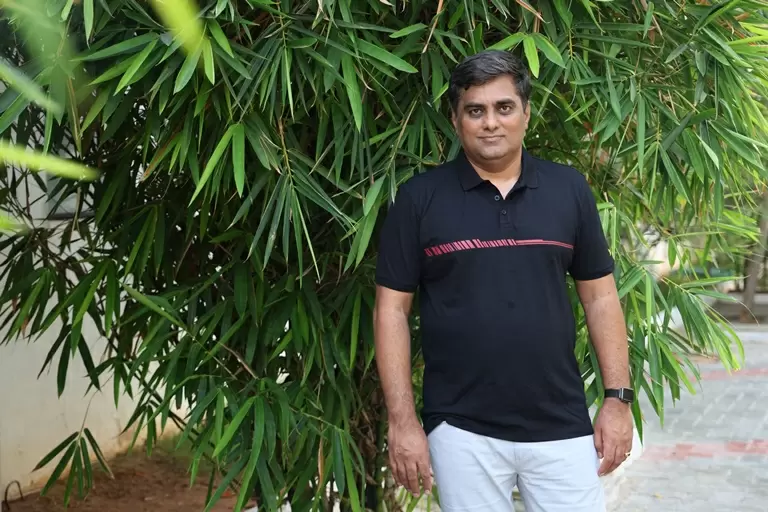
| Vijayaraghavan launched Lavos innerwear brand in 2010 |
“Initially, we made 3,000 pieces per month, including T-shirts, track pants, shorts, etc. Now, we produce up to 4 lakh pieces per month. Our major export market is the US,” says Vijayaraghavan. Today, they operate with 45 knitting machines and 850 sewing machines.
"I launched Lavos Private Limited in 2010, focusing on innerwear and T-shirts for urban millennials seeking ultimate comfort," says Vijayaraghavan. The brand's primary product is innerwear made from bamboo fibre.
However, they also produce and sell T-shirts, polos, yoga pants, camisoles, wireless brassieres, pants, panties, including period panties, shorts, briefs, boxers, trunks, and vests.
“We aren’t just a typical apparel manufacturer; we constantly explore, experiment, and develop new ideas to enhance the experience of wearing performance apparel,” Vijayaraghavan says.
Vijay even designed innerwear using a bamboo-organic cotton blend and tested it himself. “It was so comfortable that it felt like I was not wearing any innerwear,” Vijayaraghavan shares. They used bamboo performance technology (patent pending) to blend bamboo viscose, 100% organic cotton, and a bit of elastane to create the yarn.
"For female innerwear, I take inputs from my wife Lavanya," he adds. Their products are available on e-commerce sites like Amazon, Flipkart, and Myntra. “We sell close to 1,500 pieces of innerwear per day,” Vijayaraghavan says, noting that female innerwear is their best-selling product.
Online sales account for 70% of Lavos’ sales. Lavos’ products are also sold in about 10 physical multi-brand stores in Chennai and Ahmedabad. “We do not have our own store; we showcase our products in multi-brand stores,” he explains.
Throughout his journey, Vijayaraghavan has focused on innovation and sustainability. The factory in Mudalipalayam, spread over a 1.4 lakh sq ft area with a utility area of 30,000 sq ft, is located 13 km from Tiruppur.
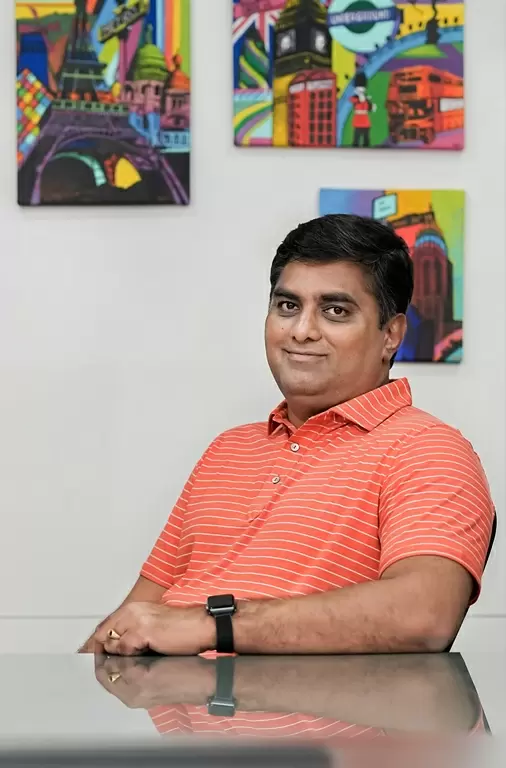
| BVK Exports India is completely run by renewable energy and sells the surplus power it generates to the state electricity board |
The company uses renewable energy such as solar and wind power for its factory and sells the surplus to the state electricity board. “We produce 36.6 million units of energy through solar and wind power in a year, but our consumption is only 1.8 million units annually,” says Vijayaraghavan.
“Our facilities use LED lights, which save 3,500 units per month. Furthermore, 95% of all effluents from our factory are recovered, treated, and reused to prevent pollution. So far, the factory has saved 22,000 PPMV (parts per million volume) of carbon emissions.”
Looking back on his early years as an entrepreneur, Vijay recalls facing challenges, including significant financial losses, due to his limited knowledge of financial management. "My father was my inspiration. He lifted my spirits and motivated me to learn from my mistakes and move forward," says Vijayaraghavan.
He attributes his success to his unique designs. “At that time, garments were plain, without any design. I began using structural designs like motifs for T-shirts, which became quite popular in the export market,” he recalls. During an era when nylon and polyester fibres dominated the market, BVK began specialising in a range of unique blends such as bamboo-cotton, merino wool, Tencel lyocell, modal, viscose, and Coolmax.
"We set ourselves apart by using 100% natural fibre for our products, from T-shirts to track pants," explains Vijayaraghavan.
The rise in cotton prices and the labour-intensive nature of its cultivation impacted small- and medium-scale garment exporters. Faced with the increasing cost of cotton and synthetic material imports, Vijayaraghavan sought an alternative material that was comparable to or even better than cotton.
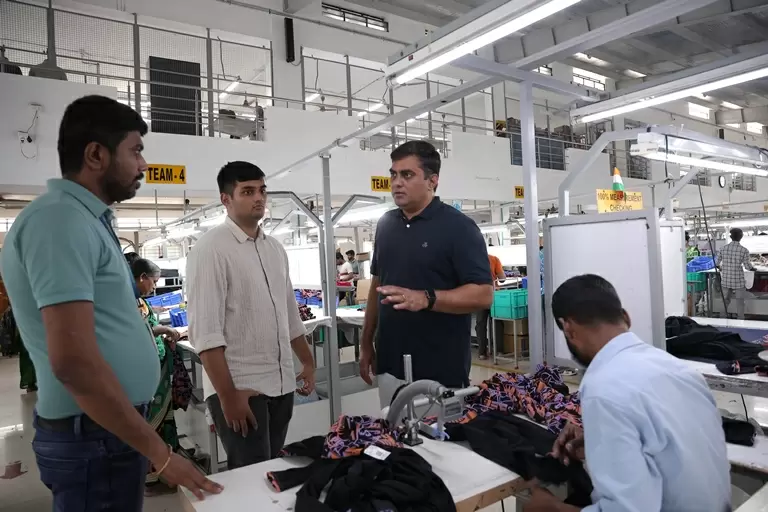
| The bamboo fibre used in the making of Lavos innerwear products is procured from North-East India |
“Cotton cultivation requires a lot of water, and synthetic material is a form of plastic,” he says. “While cotton has the maximum absorbent quality, polyester dries faster than cotton. I began looking for something in between.”
Vijayaraghavan started sourcing bamboo fibre from China between 2002 and 2004. He imported the fibre and knitted the yarn in his factory. “Now we are sourcing the yarn directly from the northeastern part of India,” says Vijayaraghavan. “We bring it as grey bamboo fibre, and the remaining process of converting it into yarn and dyeing takes place in Tiruppur.”
It took him two-and-a-half years to knit a bamboo-fibre T-shirt, which he exported to a US company on a trial basis.
“An NBA national-level basketball player who tried this T-shirt gave very positive feedback regarding the quality. He was the brand ambassador for an international brand, hence he could not promote our product,” rues Vijayaraghavan. “He wore our T-shirt beneath the one carrying the logo,” he adds.
So how different is bamboo fibre from cotton? “Very few people know that bamboo fibre is softer than cotton, naturally three degrees cooler, a natural anti-microbial, helps regulate body temperature, has natural micro-pores for better breathability, and is more durable,” says Vijayaraghavan..
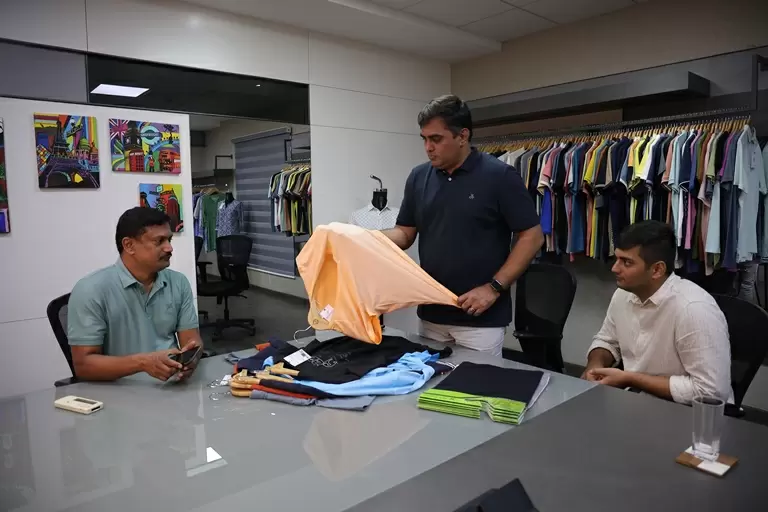
| Vijayaraghavan has plans to diversify into home furnishings in the near future |
“Additionally, bamboo fibre controls moisture, has anti-odour properties, and provides UPF 50+ sun protection, making it ideal for outdoor activities like sports.”
“To remain competitive, our products are priced on par with Jockey and Van Heusen. We also plan to diversify into home furnishings like curtains, interiors, bedspreads, etc., soon.”
Discussing his future goals, Vijayaraghavan expresses his desire to establish a knitting and sewing unit in Rajapalayam, employing only women. “If women are empowered, the whole family prospers, which in turn benefits society,” says Vijayaraghavan. - ©TWL














